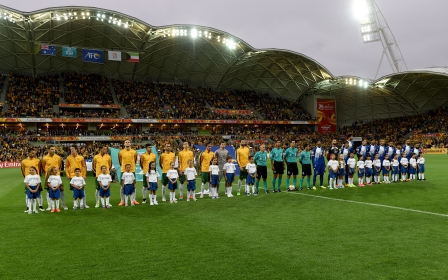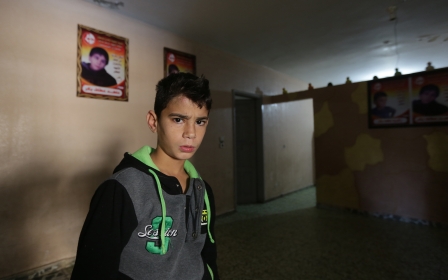World football should penalise Israel for attacking Palestinian game

It didn't take reigning champions Japan long to score their first goal as Palestine started their first ever campaign in football's Asian Cup finals with a 4-0 defeat on Monday. Mid-way through the game, commentators on satellite channel Eurosport mentioned the “slow development” of the Palestinian team over the years since its founding. No context was offered as to why this may have happened, although it should have been.
The Palestinian national team was first recognised by FIFA, football's world governing body, in 1998, following the creation of the Palestinian Authority in the Oslo Accords. FIFA was groundbreaking in this move; 17 years later the United Nations has still not fully recognised Palestine. The history of football in Palestine, however, stretches back much further.
In 1934, a Mandatory Palestine team appeared in World Cup qualifying matches. That team, however, was a product of the 'Eretz Israel Football Association' (EIFA) - one of many arms of the Zionist movement as it strove for control of Palestine. Entering the World Cup necessitated membership of FIFA whose rules required national teams to represent all inhabitants of a country, presenting a challenge to a Zionist body in Palestine given that only between 12-17 per cent of its inhabitants were then Jewish. The EIFA covered up this issue by ensuring one Palestinian-Arab attended the opening board meeting and FIFA membership was awarded in 1929. No Palestinian-Arab ever sat on the board again or played for the “national” team.
The EIFA became the Israeli Football Federation after 1948, and in 1952 the Palestine Football Federation, the predecessor of today's Palestine Football Association (PFA), was formed within the 1967-occupied lands.
Since the 1998 FIFA recognition of the PFA, the slow development referred to by commentators during the opening game of this year’s Asian Cup has continued. Sport while under occupation should hardly be expected to flourish.
Amid the Second Intifada competitive football came to a standstill. With Palestine under violent military occupation and Israeli checkpoints dividing the 1967-occupied territory into disconnected Bantustans, travel became impossible and the Palestinian leagues were suspended until 2008.
The national team however continued to compete internationally. During qualifying stages for the 2006 World Cup in Germany, Palestine topped its qualifying group after an 8-0 victory over Taiwan and a draw with Iraq. As the team prepared to travel to Uzbekistan the Israeli authorities denied travel permits to much of the squad. Although finally able to field a much-weakened team with some late replacements, Palestine lost 3-0. For the return “home” fixture, five team members were again banned from travel; the national team's “home” matches were played in Qatar, Doha and Amman as FIFA deemed playing within Palestine too dangerous.
At the opening of a new 'national stadium' in the town of al-Ram in 2008, Palestine drew 1-1 with Jordan. This was the first international match played within Palestine since its FIFA membership began 10 years earlier.
In 2012, Mahmoud Sarsak - a player in the national team - was given Israeli permission to travel from Gaza to the West Bank to play a match in Nablus. However, when Sarsak arrived at Gaza's Erez checkpoint en-route to Nablus he was immediately arrested and transferred for interrogation.
Sarsak was held under Israel's 'Unlawful Combatants Law' which allows Palestinians from Gaza to be held without trial or charge for unlimited periods of time. The case received international attention when the young footballer launched a hunger strike following the death of fellow national team player Zakariah Issa who was diagnosed with cancer whilst inside Israel's prisons. More than three months later having lost more than half his bodyweight, Sarsak ended his hunger strike with a guarantee of release.
In January 2014, two teenage footballers were shot by Israeli forces while walking home from a training session in al-Ram. Jawhar Jawhar was shot 11 times in both legs while Adam Halabiya was shot once in each foot. Both players were told by Ramallah doctors that they would never play football again.
Football stories inside Gaza are equally brutal. During its 2006 bombardment of Gaza, Israel bombed the Palestine Stadium. FIFA later provided funds to support the stadium's reconstruction after which it again smouldered under the force of Israel's bombs in November 2012.
Among the victims of last year's bombardment of Gaza was a Palestinian football legend. Ahed Zaqout is remembered by some as possibly “the best midfielder [Palestine] ever had”. Israel shelled Zaqout's house in Gaza as he slept and the former star turned TV commentator became another “statistic” amongst the 2104 victims of Israel’s summer onslaught. Some 32 sports facilities also succumbed to Israel's bombing campaign in 2014.
The stories are endless... A book could, or maybe should, be written about the almost impossible development of Palestinian football amid all this.
It was in this context that in 2014 representatives of the Palestinian Players' Federation presented FIFA with a dossier documenting Israeli attacks and restrictions on Palestinian football, yet as usual official Palestinian action fell a long way behind civil society moves.
As early as 2006, activists in the Boycott, Divestment and Sanctions campaign (BDS) sent petitions and letters to FIFA demanding its suspension of Israel highlighting “obstruction of Palestinian representation and participation in international sports”. FIFA refused to act and despite continued activism Israel was later honoured with the hosting of the 2013 UEFA under-21 Championship and then awarded the 2015 UEFA Women's under-19 championships.
Following 2014's attacks on Gaza, Palestinian football teams wrote to the president of the Union of European Football Associations (UEFA), Michel Platini, as Israel applied to host the 2020 European Championships' games. Platini himself had hinted in 2010 at possible sanctions when he said “Israel must choose between allowing Palestinian sport to continue and prosper or be forced to face the consequences.” The 2014 letter to Platini called on UEFA “not to reward Israel for colonialism, apartheid and ethnic cleansing.” The letter was supported by direct action as international activists occupied the French and Italian FA's headquarters. The BDS movement celebrated as UEFA rejected the Israeli bid although UEFA made no official statement acknowledging political influence on their decision.
There are those who naively say that sport and politics should not be mixed. That was also said when anti-apartheid protesters invaded rugby and cricket pitches in the 1980s although today the effectiveness of the sports boycott within the movement against South African Apartheid is widely acknowledged.
For Israel today, being considered a “Western” nation is an important part of its propaganda machine and its acceptance within UEFA is significant in that context. Pre-1948, Palestine was considered to be part of Asia, yet now a state built on the ruins of the same piece of land has acceptance in European bodies. The land has not physically moved, but global politics have.
The early Zionist football associations played the same game, as acknowledged on the official website of the Israeli FA, by using international football links “to create positive propaganda for Jewish settlement in Eretz Israel”. Football is one of many tools that the Zionist movement has co-opted for its colonial benefit.
Acknowledging these propaganda uses of football alongside an understanding of Israel's ongoing actions against Palestinians should be more than enough to warrant sanctions.
FIFA was well ahead of its time when it formally recognised Palestine in 1998, and it is time that it takes another pioneering yet justified step by placing sanctions on Israel just as in 1964 it did against South Africa - decades before world leaders took action. Let football lead the politicians again so that it can truly be referred to as “the global game” by defending players' rights and rejecting racism.
Photo: Palestinians playing football on a makeshift pitch in the West Bank (Wikimedia Commons / Justin Mackintosh)
Stay informed with MEE's newsletters
Sign up to get the latest alerts, insights and analysis, starting with Turkey Unpacked
Middle East Eye delivers independent and unrivalled coverage and analysis of the Middle East, North Africa and beyond. To learn more about republishing this content and the associated fees, please fill out this form. More about MEE can be found here.





